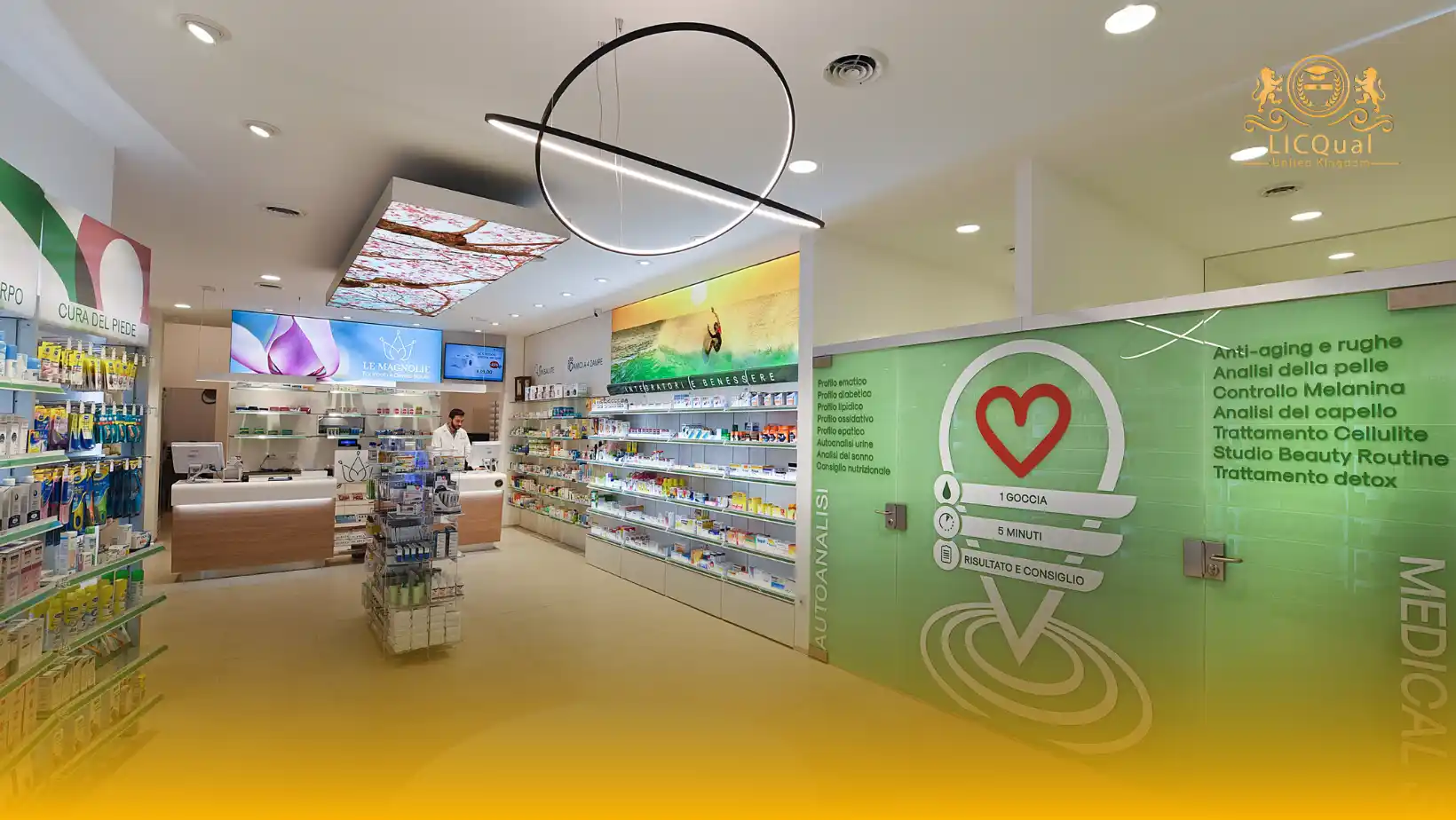The LICQual Level 6 Diploma in Hospital Pharmacy (D Hospital Pharmacy) is a specialized qualification designed for healthcare and pharmaceutical professionals who want to advance their expertise in clinical and hospital pharmacy practice. This programme goes beyond foundational knowledge to provide learners with in-depth understanding of medication management, clinical governance, patient safety, and the integration of pharmacy services within hospital and healthcare environments.
This qualification is not intended for fresh candidates. It is specifically structured for professionals already working in pharmacy, healthcare, or related sectors who are seeking to expand their knowledge, strengthen their clinical decision-making, and enhance their career progression. By undertaking this diploma, learners demonstrate their commitment to Continuing Professional Development (CPD) and position themselves as key contributors to the delivery of high-quality patient care.
The course focuses on essential areas such as advanced pharmacotherapy, therapeutic drug monitoring, evidence-based practice, and the management of pharmaceutical services within hospitals. It equips learners with the ability to collaborate effectively with multidisciplinary healthcare teams and to apply best practices in optimising patient outcomes.
Centres delivering this qualification must have competent and highly qualified staff with professional expertise in hospital and clinical pharmacy. In addition, centres are required to provide access to appropriate study materials, laboratory facilities, and digital learning resources to ensure learners benefit from a comprehensive and high-quality learning experience.
By completing this diploma, learners will gain the advanced knowledge, critical thinking skills, and professional confidence required to excel in hospital pharmacy practice and contribute meaningfully to the improvement of patient care within healthcare systems.
Course Overview
Qualification Title
LICQual Level 6 Diploma in Hospital Pharmacy (D Hospital Pharmacy)
Total Units
6
Total Credits
120
GLH
480
Qualification #
LICQ2201208
Qualification Specification
To enroll in the LICQual Level 6 Diploma in Hospital Pharmacy (D Hospital Pharmacy), applicants must meet the following criteria:
|
Qualification# |
Unit Title |
Credits |
GLH |
|---|---|---|---|
|
LICQ2201208-1 |
Clinical Pharmacy Practice and Patient-Centred Care |
20 |
80 |
|
LICQ2201208-2 |
Pharmacotherapy and Therapeutic Drug Monitoring |
20 |
80 |
|
LICQ2201208-3 |
Hospital Medicines Management and Supply Chain |
20 |
80 |
|
LICQ2201208-4 |
Clinical Governance and Patient Safety in Hospital Pharmacy |
20 |
80 |
|
LICQ2201208-5 |
Research Methods and Evidence-Based Practice in Pharmacy |
20 |
80 |
|
LICQ2201208-6 |
Leadership and Management in Hospital Pharmacy Services |
20 |
80 |
By the end of this course, learners will be able to:
Unit 1: Clinical Pharmacy Practice and Patient-Centred Care
- Apply advanced clinical pharmacy principles to deliver patient-centred pharmaceutical care.
- Collaborate effectively with multidisciplinary healthcare teams to optimise patient outcomes.
- Demonstrate critical decision-making skills in hospital pharmacy practice.
Unit 2: Pharmacotherapy and Therapeutic Drug Monitoring
- Evaluate evidence-based pharmacotherapy for a wide range of medical conditions.
- Apply therapeutic drug monitoring to ensure safe and effective medication use.
- Adjust treatment plans based on clinical outcomes and patient-specific factors.
Unit 3: Hospital Medicines Management and Supply Chain
- Manage hospital medicine procurement, storage, and distribution systems effectively.
- Ensure compliance with hospital policies, safety standards, and regulatory requirements.
- Implement strategies for the safe and cost-effective use of medicines in hospitals.
Unit 4: Clinical Governance and Patient Safety in Hospital Pharmacy
- Apply principles of clinical governance to hospital pharmacy practice.
- Monitor, report, and evaluate adverse drug reactions and medication errors.
- Develop strategies to minimise risks and enhance patient safety.
Unit 5: Research Methods and Evidence-Based Practice in Pharmacy
- Design and conduct research projects relevant to hospital pharmacy practice.
- Critically evaluate scientific literature and apply evidence-based findings to patient care.
- Integrate research outcomes into clinical practice to improve pharmacy services.
Unit 6: Leadership and Management in Hospital Pharmacy Services
- Demonstrate effective leadership and management skills in hospital pharmacy settings.
- Supervise, motivate, and develop pharmacy teams to achieve service excellence.
- Apply strategic management principles to improve hospital pharmacy operations and healthcare delivery.
The LICQual Level 6 Diploma in Hospital Pharmacy (D Hospital Pharmacy) is designed for experienced professionals working in pharmacy, healthcare, and related fields who are ready to take their careers to the next level. This qualification is not intended for fresh candidates, but for learners who already have practical experience and are motivated to enhance their expertise and strengthen their Continuing Professional Development (CPD).
This course is ideal for:
- Hospital Pharmacists who wish to expand their clinical knowledge, improve patient care, and progress into senior or specialised roles.
- Clinical Pharmacists and Pharmacy Practitioners seeking to develop advanced skills in pharmacotherapy, therapeutic drug monitoring, and patient-centred care.
- Pharmacy Managers and Supervisors aiming to strengthen their leadership, medicines management, and hospital pharmacy service delivery.
- Healthcare Professionals working within hospital and clinical environments who want to broaden their understanding of medicines management and clinical governance.
- Researchers and Academics in Pharmacy looking to enhance their expertise in evidence-based practice and contribute to innovation in hospital pharmacy.
- Learners committed to CPD and motivated to gain internationally relevant skills to excel in clinical and hospital pharmacy practice.
By enrolling in this diploma, learners can gain advanced knowledge, leadership capabilities, and specialized expertise that will enable them to make meaningful contributions to hospital pharmacy and healthcare services.
Centres delivering the LICQual Level 6 Diploma in Hospital Pharmacy (D Hospital Pharmacy) must demonstrate the capacity to provide high-quality education and training that meets international standards. To ensure learner success and professional development, centres are required to maintain qualified staff, appropriate facilities, and comprehensive resources that support both theoretical and practical learning.
Key requirements include:
- Qualified and Experienced Staff – Centres must employ trainers, assessors, and mentors with recognised qualifications and professional expertise in hospital pharmacy, clinical pharmacy, or pharmaceutical sciences.
- Access to Specialist Learning Resources – Learners must be provided with updated study materials, reference texts, research publications, and access to digital platforms that enhance independent and guided study.
- Clinical and Practical Facilities – Centres should have access to appropriate hospital or simulated clinical environments, laboratories, and equipment to facilitate practical application of advanced pharmacy concepts.
- Strong Quality Assurance Systems – Internal quality assurance processes must be in place to ensure fair assessment, consistent delivery, and continuous improvement in teaching standards.
- Comprehensive Learner Support Services – Academic mentoring, research guidance, and career development support should be available to help learners achieve their professional goals.
- Commitment to CPD – Centres must encourage Continuing Professional Development (CPD) for both staff and learners, ensuring alignment with evolving healthcare practices and international standards.
By fulfilling these requirements, centres can provide a robust and professional learning environment that equips learners with the advanced knowledge, skills, and confidence needed to excel in hospital pharmacy practice and make a significant impact in healthcare services.
Assessment and Verification
All units within this qualification are subject to internal assessment by the approved centre and external verification by LICQual. The qualification follows a criterion-referenced assessment approach, ensuring that learners meet all specified learning outcomes.
To achieve a ‘Pass’ in any unit, learners must provide valid, sufficient, and authentic evidence demonstrating their attainment of all learning outcomes and compliance with the prescribed assessment criteria. The Assessor is responsible for evaluating the evidence and determining whether the learner has successfully met the required standards.
Assessors must maintain a clear and comprehensive audit trail, documenting the basis for their assessment decisions to ensure transparency, consistency, and compliance with quality assurance requirements.




